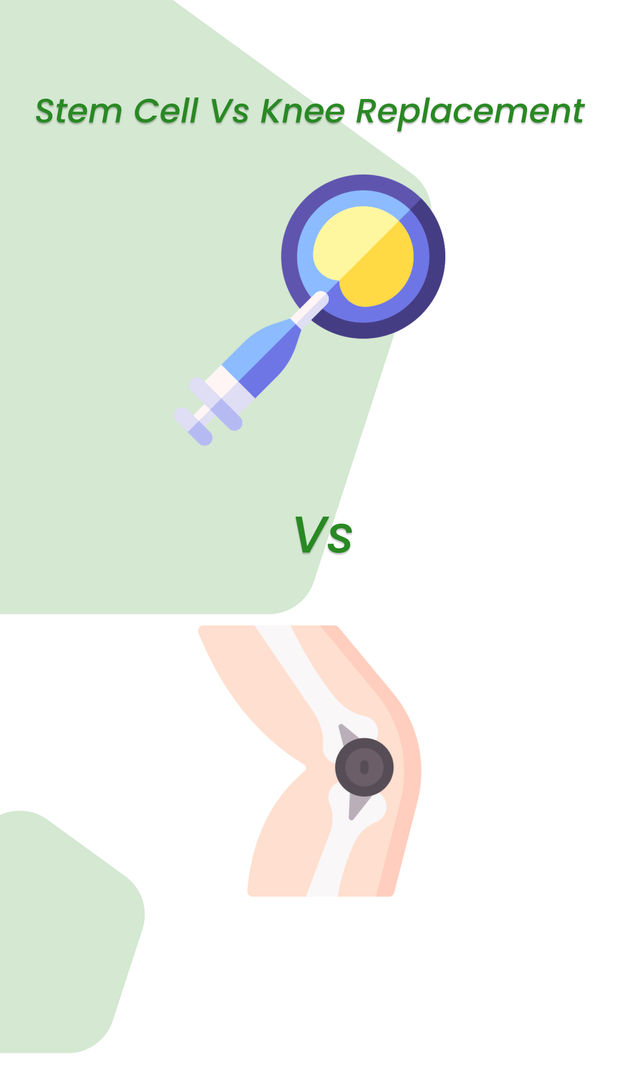Overview
Knee pain is a prevalent issue affecting millions of people worldwide, particularly in India. The country has seen a significant rise in knee-related problems due to factors like aging, obesity, and a sedentary lifestyle. According to recent statistics, approximately 15 million Indians suffer from knee osteoarthritis, with many seeking effective treatment options. For years, surgical knee replacement was the sole recourse for severe cases. However, stem cells for knee problems became another potential solution that has emerged. This blog, Stem Cell Treatment vs Knee Replacement, will delve into the differences, advantages, and drawbacks of these treatments, focusing on their application.
Which is the optimal choice for you?
In our exploration, we unravel the answer, guiding you through the possibilities for a healthier and more informed decision. Stay tuned till the end.
What is Stem Cell Treatment?
Your health is too important to ignore – schedule your appointment now.
Stem cells are immature cells found in various parts of our bodies that can differentiate into any tissue.
They can be found in our bone marrow, fatty tissues, and circulating blood, among other places. Of course, different stem cells help treat different types of health conditions.
Stem cell therapy is a reasonably new treatment in the medical world. It is still undergoing clinical trials, which have shown promising results. However, the FDA still needs to approve this treatment.
Excessive wear and tear or an inflammatory condition usually damages our knees, and sometimes, an accident results in an injured knee.
Stem cells have several unique properties that can help heal your damaged knee and form new cells to replace the ones damaged beyond repair.
Want to know more?

As if this weren’t enough, researchers have also created cartilage from stem cells in the laboratory, which can then be inserted into the affected knee.
Another plus point of stem cell therapy is how easy the procedure is. All of it is done under local anesthesia, and you only need to spend three to five days in the hospital.
Most clinical trials use the patient’s stem cells, making them easily accessible. The recovery period is only about a week, after which you can resume your daily activities.
The stem cells inserted into the damaged knee continue to form new cells for almost a year, and the benefits have been reported to last up to three years after the stem cell procedure. After this period, one might be required to undergo another stem cell transplant.
Did you know that stem cell therapy has a success rate of nearly 80%?
Yes, 80% of treated patients in clinical studies have reported reduced pain and improved mobility. All this without having to undergo surgery.
Take charge of your health and your life. Contact us today!
About Knee Replacement
Knee replacement or knee arthroplasty is an out-and-out surgical procedure that replaces a part of, or your entire knee joint. For decades, it has become the standard medical solution for severe cases of arthritis and knee damage.
In knee replacement surgery, the damaged knee joint is removed and replaced with a prosthesis. It is considered a last resort for people who have extreme pain and mobility issues.
So why exactly would one need a knee replacement?
Our knees have cartilage that absorbs movement shocks when we walk around. When this cartilage is damaged due to an inflammatory condition, excessive wear and tear, or an accident, simple tasks like walking can cause immense pain.
At this point, a knee replacement surgery is carried out. The surgery is carried out under general anesthesia in most cases. The new prosthetic is usually made of metal, plastic, or both.
While discharge from the hospital after the surgery is given in three to five days, the recovery period lasts from six weeks to three months. Apart from physical therapy, one’s movements are restricted during this period.
Following the proper instructions, the knee replacement lasts nearly fifteen years in 90% of cases. However, in some cases, scar tissue is formed at the surgery site, giving the patient no relief from pain.
Knee replacement surgeries have a high success rate and are now routine medical procedures. However, since they are a type of surgery at the end of the day, they carry certain risks that come with all surgeries.
The biggest risks are blood clots in the legs or lungs and nerve damage. However, the prevalence rate of these risks is quite low.
Take charge of your health and your life. Contact us today!

Is stem cell better than knee replacement?
When comparing stem cell treatment vs knee replacement, several factors must be considered, including the patient's condition, age, and overall health.
Effectiveness
- Stem Cell Treatment: Effective for mild to moderate arthritis, with the potential to delay or avoid surgery.
- Knee Replacement: Highly effective for severe arthritis or damage, providing long-term relief.
Recovery Time
- Stem Cell Treatment: Minimal recovery time, with most patients resuming activities within days.
- Knee Replacement: Extended recovery period, often requiring months of rehabilitation.
Cost
- Stem Cell Treatment: Generally higher upfront cost, but delaying surgery may save money in the long term.
- Knee Replacement: Significant surgical costs, including hospitalization and rehabilitation.
FDA Approval and Regulation
- Stem cell treatment: Stem cell treatments for knee osteoarthritis are not yet FDA-approved, and their use remains experimental.
- Knee replacement: On the other hand, knee replacement surgery is a well-established and FDA-approved procedure with a long track record of success.
Stem cell therapy has shown promising results in its clinical trials. It is also the only treatment that grows back the body’s cells. Theoretically, this will provide better long-term results and strength and help the patient live a life with more mobility.
However, stem cell treatments are still undergoing clinical trials. More long-term follow-up data is required to judge its effects on damaged knees. This treatment is new, and researchers must fine-tune it to enhance its efficacy.
To answer this question, your physician is the best person to take a call. In some cases, stem cell treatment might be the better option, especially if the patient has certain health conditions that don’t allow them to undergo surgery.
Can stem cells be used instead of knee replacement?
Stem cells can be a viable alternative to knee replacement, especially for patients with early-stage arthritis or those seeking a less invasive option. However, we must remember that they are still not FDA-approved, and it is essential to consult a healthcare provider to determine the most appropriate treatment based on individual needs.
Hope this article cleared your confusion about the difference between the two procedures and helped you decide the right treatment for you!
Disclaimer
Stem cell therapy offers promising hope for the treatment of many diseases, including neurological and autoimmune conditions. However, it is important to note that most of these treatments are currently under clinical trial and have yet to receive FDA approval. The success rates mentioned are based on ongoing clinical trials. This blog is for informational purposes, and we are not promoting stem cell therapy. Individuals should consult with qualified healthcare professionals to discuss potential risks and benefits.






